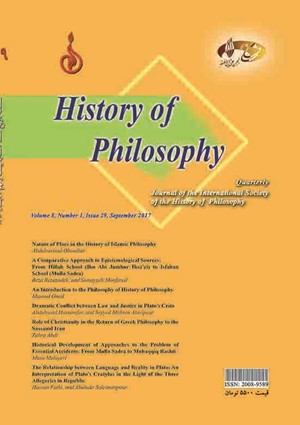Historical Development of Approaches to the Problem of Essential Accidents: From Mulla Sadra to Muhaqqiq Rashti
Subject Areas : Etymology of philosophical terms
1 -
Abstract :
The present paper deals with one of the most important and complicated epistemological problems targeted by Muslim philosophers, that is, determining the referents and realm of essential accidents. The main question here is whether accidents are considered to be essential through the more particular. In this historical study, the writer examines the development of the various theories regarding this problem over three centuries (1050-1312 AH) and then reports and evaluates the solutions suggested by four of the most prominent theoreticians of this historical period. To this end, he initially explores Mulla Sadra’s solution, which is based on the necessity of distinguishing between particular accidents and accidents through the more particular. Then he discusses the view of Hossein Khwansari, who, after criticizing Mulla Sadra’s theory and acknowledging its weakness in solving the problem, presents his own theory of juristic preference and consensus in determining territories and setting boundaries between sciences. Later the writer deals with the views of Mulla Mehdi Naraqi, who accepts a part of Mulla Sadra’s theory but solves some parts of the problem using a different method. Naraqi’s method necessitates the screening of sciences and extracting some problems from the domains of related sciences. Finally, the writer focuses on the last character of this period, Mirza Habibullah Rashti. He was a capable fundamentalist who enriched this discussion more than ever before in the light of his own profound insight and increased the accuracy of the technical language used to describe the problem. Although he benefitted from the words of other thinkers, he did not accept the solution of any of the preceding philosophers in its totality. He believed that the scholars working in each field are allowed to discuss the related scientific problems within the borderlines of their own knowledge as long as no specific sciences have been devised for investigating them. This view, as explained in the body of the paper, is quite compatible with the apriori-historical approach to the development of various disciplines.
ابن¬سينا، برهان شفا، تحقيق ابوالعلا عفيفي، قم، ذوي¬القربي، 1434.ق.#
جرجاني، علي، حاشيه بر شرح مطالع، نسخه خطي، کتابخانه مجلس شوراي اسلامي، شماره ثبت 26634، شماره قفسه 2453.#
خوانساري، آقا حسين، الحاشيه علي الهيات¬الشفا، تحقيق حامد ناجي اصفهاني، قم، انتشارات سلمان¬فارسي، 1378.#
دواني، جلال¬الدين، شرح تهذيب المنطق، نسخه خطي، کتابخانه مجلس شوراي اسلامي، شماره ثبت 91027، شماره قفسه15483. #
رازي، قطب الدين، شرح مطالع الانوار، تصحيح ابوالقاسم رحماني، تهران، انجمن حکمت و فلسفه، 1393. #
رشتي، ميرزا حبيب¬الله، بدايع¬الافکار، قم، مؤسسه آل¬البيت، بي¬تا.#
سبزواري، ملاهادي، تعليقه بر الاسفار الاربعة، بيروت، داراحياءالتراث¬العربي، 1981 م.#
سبزواري، ملاهادي، منطق منظومه، تصحيح مسعود طالبي، قم، دفتر تبليغات اسلامي، 1380.#
فارابي، ابونصر، المنطقيات، تحقيق محمدتقي دانش¬پژوه، قم، کتابخانه آيت¬الله مرعشي، 1408.ق.#
ملاصدرا، الاسفار الاربعة، تصحيح و تحقيق غلامرضا اعواني؛ باشراف و مقدمه استاد سيدمحمد خامنهاي، تهران، انتشارات بنياد حکمت اسلامي صدرا، 1383. #
ملاصدرا، الشواهد الربوبية، تصحيح، تحقيق و مقدمه مصطفي محقق داماد؛ اشراف استاد سيدمحمد خامنهاي، تهران، انتشارات بنياد حکمت، 1382.#
ملاصدرا، تعليقه بر الهيات شفا، تصحيح، تحقيق و مقدمه نجفقلي حبيبي، باشراف استاد سيدمحمد خامنهاي، تهران، بنياد حکمت اسلامي صدرا، 1382.#
ملاصدرا، رسائل فلسفي، تصحيح حامد ناجي اصفهاني، تهران، انتشارات حکمت، 1378.#
نراقي، ملامهدي، شرح¬الالهيات من¬کتاب الشفا، تحقيق مهدي محقق، تهران، مؤسسه مطالعات اسلامي دانشگاه مک¬گيل، 1365.#


